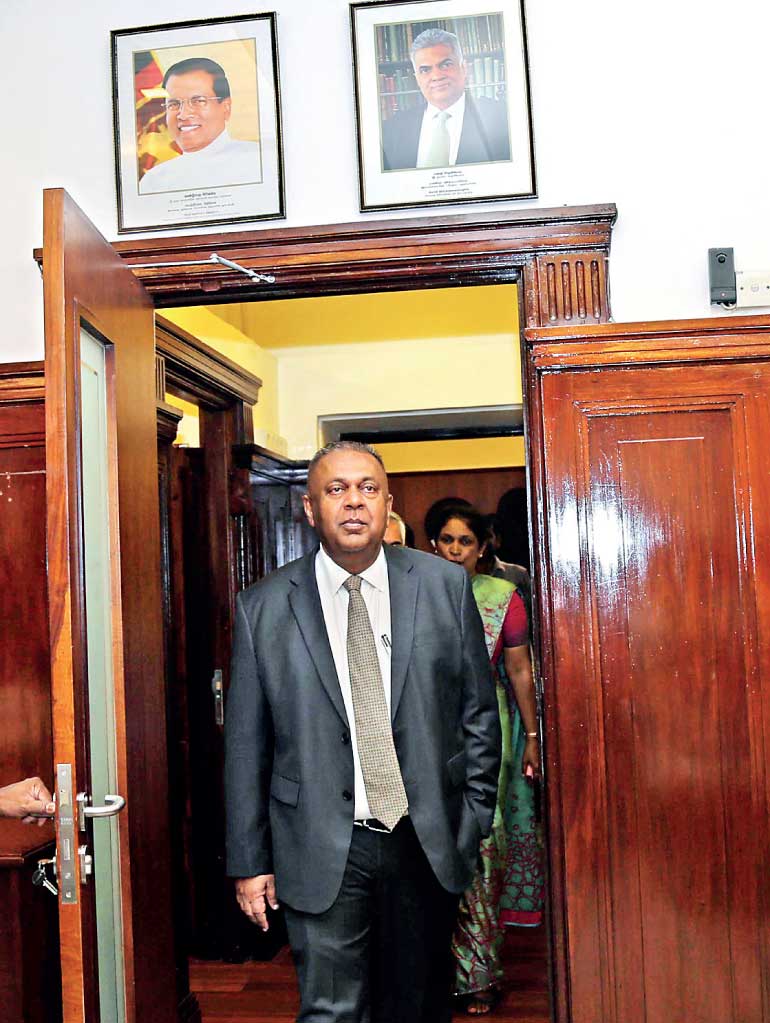Wednesday Feb 18, 2026
Wednesday Feb 18, 2026
Monday, 29 May 2017 00:01 - - {{hitsCtrl.values.hits}}
By Patrick de Silva
So Asia-Pacific’s Best Finance Minister 2016 was sent on a different assignment, and the reigns of the exchequer now lie in the hands of Hon. Mangala Samaraweera, who takes the helm at a challenging time. The pressures of the ongoing disaster situation apart, burgeoning costs, flagging revenues, the falling rupee, inflation, growing public debt and a balance of payments crisis will no doubt give Samaraweera much to think about.
To his credit, Minister Samaraweera is often considered a pragmatist, with a balanced take on world affairs, a man for the modern milieu. Accordingly, we anticipate he will extend these viewpoints to his management of the country’s economic future and provide relief from the perpetual mire we seem to be stuck in. To help him in his cause, I would wish to point out a few items that could help enhance revenue and release our debt burdens.
 Finance Minister Mangala Samaraweera enters his office to assume duties last week - Pic by Pradeep Pathirana
Finance Minister Mangala Samaraweera enters his office to assume duties last week - Pic by Pradeep Pathirana
Rising interest rates are bad for borrowers but rewarding for savers, and the current high interest rate regime – and it should be higher – has drawn the attention of the Sri Lankan expatriate community, and even of foreigners currently employed or engaged with the country.
A well fashioned term deposit scheme targeting high net worth local and international investors could attract much-needed foreign currency inflows and investment capital that would prove mutually beneficial in the medium term. We must not merely focus on large investment funds, but broaden our scope towards small- and medium-scale individuals with funds.
Then a solution to our motoring madness. Every year, Sri Lanka faces a huge outflow of foreign exchange due to unwarranted and excessive imports of vehicles. The consumption mindset of our fellow Sri Lankans coupled with the lack of adequate public transport has resulted in an influx of vehicles on our streets – with borrowers often biting off more than they could chew.
Congestion eats into people’s time, energy and money and the wastage on the streets now at any time of the day is insurmountable.
We need to do a Singapore. We need to put a cap on the number of vehicles reaching the country, and achieve better balance via an age and cost tier-based tax system for vehicles that moderates purchase decisions in a practical and feasible manner. A toll for vehicles entering Colombo daily would also be highly recommended for revenue and traffic control.
No doubt you would be met with resistance but the national need surely outweighs the want of a selfish few and perhaps our parliamentarians can be brought into the loop.
Then on the topic of excise. Not too long ago, the Government increased the prices of cigarettes by almost 45% in a month, resulting in a drop in consumption of legal cigarettes and a sharp increase in illicit consumption. We need to be more prudent in our projections and not be carried away with the wants of personal fame and glory when implementing national policy. Illicit cigarettes have grown over 1,000% since the price revision, resulting in over Rs. 50 billion in losses for the Government in just nine months.
Whether you could effect a reduction in price may be politically unpopular, but a further increase would no doubt be lunacy, as it has done nothing to reduce smoking in the country.
It has also come to light that a draft Cabinet paper proposes a ban on the sale of tobacco and alcohol products within 100 meters of any place where persons under 21 gather, plus, a ban on smoking at public places including beaches and private restaurants. There is virtually no place where children do not gather given the number of schools, tuition centres and places of religious worship that adorn our small island. Such a law will only drive consumers underground to discover new and illegal means to appease their needs.
The enforcement of such draconian measures would, as per estimates, impact Government revenue to the tune of Rs. 150 billion, and for a nation espousing a megapolis and becoming a regional tourist hub these are surely steps away from the right direction. Our war must be against drugs and narcotics, against contraband and smuggling – to deprive consumers of what they deem basic necessities is to compel them to go underground.
In addition, it is highly imprudent and impractical to deprive the exchequer of Rs. 150 billion in legal revenue, to then borrow from international markets to make up for the loss and add to public debt, whilst converting consumers into users of illicit smuggled products.
Agriculture inputs need to be improved. Whilst there is a great deal of support towards agriculture and small estate development, the acquisition of agricultural land for development projects and housing has placed a great deal of pressure on national production, compelling larger imports of what was traditionally self-sufficient produce like coconuts, paddy and several types of vegetables. A broader outlook and policy is necessary to improve domestic livelihoods via agriculture and safeguard local economies and savings via a cohesive program in this respect. Development is imperative, but it mustn’t come at the cost of our strengths and values.
There are a few talking points for the Honourable Minister to consider as quick measures to serve the short to medium term to safeguard revenue and reduce pressure on borrowings. What Sri Lanka needs is a well-structured long-term plan that has the buy-in of all parties to ensure the policy remains steadfast despite whatever changes in the administrative body.
Leaders from both sides are well aware of what needs to be done. What we lack is the political will and maturity to do what is right!